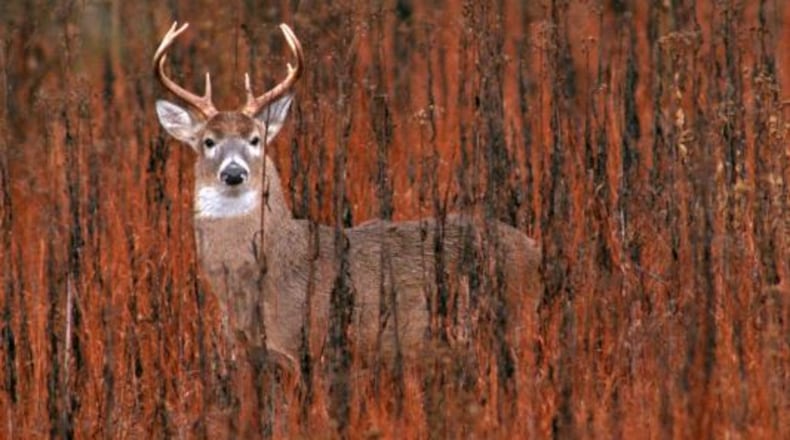Some residents in a south Fayette County community have locked horns with their homeowners association over the HOA’s deer-killing plan.
The HOA at the Whitewater Creek Country Club subdivision recently told residents it plans to cull part of the whitetail deer population in the area saying the deer have become a nuisance and a danger, especially to motorists in the 330-home, tree-lined community.
But some residents dispute that claim, insisting the community is not overrun with deer. The HOA’s decision to unilaterally cull the herd has angered the residents who say the plan undermines the reason many people moved to the community.
“This was a wildlife area before houses were ever built out here,” said Donna Heinlen who has lived in the community 16 years. She says she sees four to five deer a week. “A lot of people who bought houses here did so because they enjoy wildlife. For our homeowners association to come along and decide to cull the deer because a few people are getting their plants eaten is ridiculous. Deer eat plants. You should know that before you buy a house in an area like this. The wildlife are here for us to enjoy.”
The HOA plan initially called for federal sharpshooters to cull the herd but the HOA, which has declined to discuss the matter, has since backed away from that idea and is considering using bowhunters instead. Opponents say that alternative is crueler than shooting because the deer often suffer before dying.
The Fayette case highlights the ongoing fight among communities nationwide over how to co-exist with wildlife. More subdivisions are usurping wildlife habitats. The growth of subdivisions have thinned out the natural predators like wolves and coyotes. As a result, deer populations have grown exponentially, especially in the eastern part of North America, says Christopher Dick, professor of ecology and evolutionary biology at University of Michigan.
Consequently, as deer become accustomed to living around humans, backyards and parks are becoming an all-you-can-eat buffet for them, Dick said.
As an ecologist, Dick says culling "will eventually replace predators and hunting. It has to replace it. Unless there's some type of disease that sweeps through. The only real mortality of these deer is when they collide with vehicles and that's not good."
Dick noted that Ann Arbor faced a similar issue and is using a combination of culling and non-lethal animal control methods, such as sterilization.
Fayette County officials have stayed out of the dispute so far.
“We’re not going to weigh into it unless they ask us,” Fayette Commission Chairman Charles Oddo said. If the HOA decides to go ahead with its sharpshooting plan, it would have to get a shooting permit from the county.
The HOA’s decision prompted residents opposed to the killing to form a group called Concerned Citizens Against Deer Eradication and hire a Washington, D.C. law firm to stop the HOA’s deer-kill plan.
Robert Goldberg, an attorney who lives in the community and is heading the opposition, cited other communities such as Sun City Peachtree in Griffin that are peacefully co-existing with its deer population.
“This is an important case. It’s bringing out interaction between us and wildlife in the suburbs,” Goldberg said.
The Whitewater Creek controversy surfaced a few months ago after the HOA sent notices about the proposed eradication plan. Some residents balked and asked that the issue be put to a vote. The HOA responded by saying it was elected to represent the residents, Heinlen said.
“We felt very defeated and dejected at that point,” Heinlen recalled. That’s when residents banded together, concerned for the deer as well as residents’ safety if the HOA proceeded with its deer-eradication program. Some residents worried people could get hurt from stray bullets if sharpshooting was used.
“I’m not some crazy animal-rights person. I just don’t see the threat,” said Goldberg who has spent thousand of dollars of his own money to fight the HOA plan. He is training for a marathon and says he has not encountered a lot of deer during his frequent runs.
“They’re saying there’s an infestation. That’s like lots and lots of them,” Goldberg said. “I’ve seen (at most) 12 to 15 deer (at any given time) and then they disperse. There’s deer but it’s not an inordinate amount of deer.”
Goldberg said the HOA did not consider input from residents on the matter when it devised its eradication plan.
“Don’t use my (HOA) dues to kill the animals we love. That’s why people are so incensed. That’s why it’s striking a nerve.”
What happens to a deer that is killed under a deer-eradication program?
University of Michigan ecologist Christopher Dick said often hunters’ groups will pay for deer to be processed and the meat is then given to food banks. “It’s a great source of organic meat,” Dick said.
About the Author
Keep Reading
The Latest
Featured


